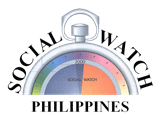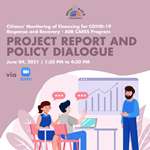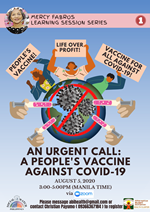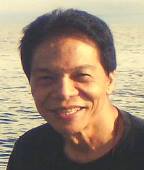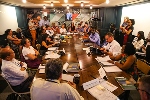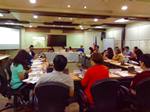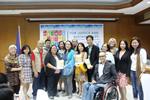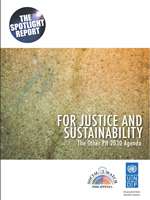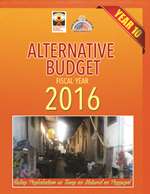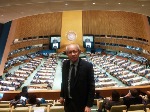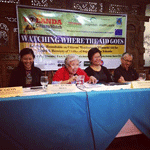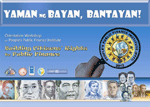Philippines
2022 Philippine People’s Scorecard on the Global Goals The covid-19 pandemic has increased poverty and inequality in the country and has laid bare the weaknesses of the public health and social protection systems, educational systems as well as provision of livelihoods and employment to Filipinos. This has led to catastrophic consequences for workers and their families, the majority of whom are in the informal sector and many of whom are women.
Yet, two years since the onset of the Covid-19 pandemic, there has been no fundamental change in the government’s developmental strategy to address these systemic weaknesses and prioritize the care programs and services that our people need. Emerging from what seems to be the worst period of the Covid-19 pandemic, the country is slowly returning to some semblance of ‘normalcy’ (or what is also referred to as ‘the new normal’). It would seem that the dominant mindset of policymakers, especially those managing the economic levers, is that it is back to business as usual, where the private sector is seen as the main driver of development and with the government basically providing the ‘enabling policy environment.’
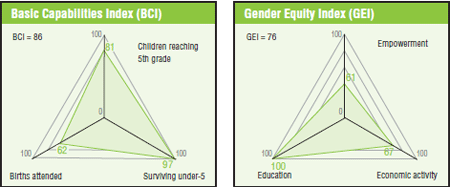
Published on Thu, 2022-12-15 14:48
Social Watch Philippines (SWP) - Alternative Budget Initiative Health Cluster (SWP - ABI) held a three-day capacity-building workshop on budget and policy advocacy and campaigns for water, sanitation, and hygiene at Hive Hotel and Convention Center, Quezon City on November 23-25, 2022. The activity was also accessible online via Zoom. The workshop training was participated by civil society organizations working on health, environment, and human rights, and those representing persons/children with disability, older persons, and urban poor communities.
|
Published on Thu, 2021-06-03 13:18
Social Watch Philippines is organizing a Policy Dialogue on June 4, 2021 (Friday), from 1:30PM-4:30PM (Manila time) via Zoom in order to present the findings on the Citizens' Report of the AIIB Financing for COVID-19 Response and Recovery as well as key recommendations of the research to government leaders as well as representatives from civil society, people’s organizations, and other stakeholders.
The objective of the Policy Dialogue is to present the Final Report to policymakers, to the CSO community, the media, and other stakeholders, in particular the key findings as well as recommendations, and to collectively generate learnings and insights on the importance of citizens’ engagement in the various aspects of public financing, including the accessing of loans, for government programs to combat the negative effects of the COVID-19 pandemic.
|
Published on Thu, 2020-09-03 00:00
Social Watch Philippines, Action for Economic Reforms and other civil society organizations deepen our understanding of the implications of #COVID19 on the economy, social policies, gender, rural and urban perspectives.
|
Published on Tue, 2020-08-04 15:26
Social Watch Philippines-Alternative Budget Initiative in Health (SWP-ABI Health) is launching the "Mercy Fabros Learning Session Series.”
Social Watch Philippines-Alternative Budget Initiative in Health (SWP-ABI Health) invites you to the first episode tackling a timely public health discourse, “An Urgent Call: A People's Vaccine Against COVID-19" on August 5, Wednesday, (via Zoom).
The pandemic is changing our lives and economies in profound ways. So massive has been the wastage of lives and the devastation caused by COVID-19 to health systems everywhere that humanity's survival has become a top priority concern.
|
Published on Thu, 2020-03-19 22:03
Social Watch Philippines, together with a number of Filipino academics and civil society representatives, present a policy matrix that identifies urgent issues, provides analyses and outlines recommendations on trade and development from a wide range of actors from civil society, the academe, and private sector in time for the preparatory process leading to the UNCTAD XV Conference to be held in Barbados from 18 to 23 October 2020.
|
Published on Mon, 2020-02-10 08:57
In the Philippines, the preparation of the country's VNR report 2019 catalysed a multi-stakeholder consultation process to which some CSOs, like Social Watch Philippines (SWP) were invited. SWP, in turn, convened a broader consultation process that will result both in inputs to the VNR as well as in an independent civil society report.
The Philippines is currently one of the fastest growing economies of the world, with GDP hovering around 6 to 7 percent in 2018 and growing at an average of almost 5 percent a year in the last decade, but those figures coexist with a high poverty rate, a paradox situation called ‘jobless growth’.
SWP comments that “there seems to be an unspoken yet dominant perspective on wealth, that as long as poverty is minimized, there should be no objection to the unbridled gains of the rich. It is assumed that wealth will trickle down to the poorest.
|
Published on Tue, 2019-07-16 13:25
In an event in 10 July 2019, Social Watch Philippines (SWP) led a discussion called, “Conversation on Tobacco Control Initiatives, Impact of 17th Congress Tobacco Tax Increase, and Universal Health Care- Implementing Rules and Regulations” where the SWP Spotlight Report for 2019 on the SDGs entitled “The PH SDG Agenda: Closing Gaps, Overcoming Policy Incoherence” and the Philippine VNR were discussed by SWP Co-Convenor Dr. Maria Victoria Raquiza and the National Economic and Development Authority Usec. Rosemarie G. Edillon, PhD respectively. Three years ago, SWP has also made its statement on SDGs, through its Spotlight Report, on overcoming poverty and achieving sustainable development.
|
Published on Mon, 2019-07-01 00:00
 |
The upcoming 2019 High-Level Political Forum (HLPF) in July in New York with the theme, “Empowering people and ensuring inclusiveness and equality,” spurred Social Watch Philippines (SWP) and other organizations like the Global Call to Action against Poverty (GCAP), Save the Children, Philippine Alliance of Human Rights Advocates (PAHRA), Institute for Social Entrepreneurship in Asia (ISEA), Plan International, Philippine Social Enterprise Network (PhilSen), Tebtebba, Voice of the Free, and Fair Trade Alliance among others, to organize a broader CSO consultation workshop to catalyze a process for civil society organizations (CSO) from different sectors towards engaging the Philippine government on the Voluntary National Review (VNR). With the support from United Nations Development Programme (UNDP), Save the Children Philippines and Philippine Alliance of Human Rights Advocates (PAHRA), a consultation workshop Towards Coherent Policies for Sustainable Development Goals (SDGs) in the Philippines: Civil Society Organizations (CSO) Inputs to the Voluntary National Review (VNR) was held on February 7 to 8, 2019 in Quezon City, Philippines participated by around 70 representatives of different civil society organizations.
|
Published on Tue, 2019-05-28 09:11
The Philippine Congress, particularly the Senate, has a handful of days left to pass important legislation. One of the urgent bills that the Senate should pass is the increase in the tobacco tax rate.
The Executive has strongly endorsed the bill of Senator Manny Pacquiao and has even certified its urgency. Pacquiao’s bill proposes a tax rate of P60 (against the current rate of P35). Subsequently, the rate increases by 9% annually to keep cigarettes less affordable in light of rising income and inflation. Senators Sherwin Gatchalian and JV Ejercito have bills that introduce higher rates — P70 and P90, respectively.
|
Published on Fri, 2019-03-15 12:23
Under the motto "Imagining Gani", Social Watch Philippines gave tribute last March 11 to Isagani Serrano, who passed away last February 22nd. Gani was a Co-Convenor of Social Watch Philippines and a contributor to the national Social Watch reports for several years. He was president of the Philippine Rural Reconstruction Movement (PRRM) and author of numerous papers and reports on climate and social justice.
Roberto Bissio, from the international secretariat of Social Watch, contributed a personal testimony: "Guiding Gani through Montevideo at his first visit to my hometown was not an easy a task, as his curiosity was insatiable. He definitely had to visit the places where tango was born, and impressed me with his knowledge of the songs and biography of the legendary singer Carlos Gardel. And he insisted on visiting the old jail of Punta Carretas, then already transformed into a shopping center, out of which over a hundred political prisoners escaped in the early seventies through a tunnel. "That episode costed me six months of solitary confinement" remembered Gani to my surprise. In those times Gani was a prisoner himself in the Philippines "and when we heard the news of the tupamaros escaping, we started digging ourselves... but got caught!"
|
Published on Mon, 2019-02-25 11:57
Gani passed away last February 22nd. Gani was a Co-Convenor of Social Watch Philippines and a contributor to the national Social Watch reports for several years. As a president of the Philippine Rural Reconstruction Movement (PRRM), visit http://www.prrm.org/isagani-r-serrano.html.
|
Published on Wed, 2019-01-23 16:05
In the Philippines, with a huge mandate to back it up, the government of President Rodrigo Duterte (locally referred to as “DU30”) set off on a long-term goal consistent with the 2030 Agenda, promising to end poverty by 2040 and building a more fair, prosperous, stable and peaceful society through inclusive economic growth that minds environmental limits.
Two years down the road, Isagani Serrano, president of the Philippines Rural Reconstruction Movement and a convener of Social Watch Philippines, reports that “DU30 appears on track with its 7-8 percent annual economic growth target because of a massive ‘build, build, build' infrastructure programme accounting for 5.4 percent of GDP in 2017. The negative impact of this programme, specifically conversion to other land uses of already diminishing farmlands, is still to be determined. But the fossil fuel- intensive infrastructure and power programmes and projects could reverse modest gains achieved in environmental protection and rehabilitation.”
|
Published on Mon, 2018-07-16 00:00
The experience of Voluntary National Reviews and of Civil Society shadow (or spotlight) reporting.
How it is key for meaningful participation and accountability
The side event "SDG Implementation at National Level: What’s the Point of National Reports?" was held on July 17 in New York, during the meeting of the High Level Political Forum of the UN. The debate focused on voluntary national reports (VNRs) and parallel “shadow” or “spotlight” reports generated by civil society organizations (CSOs) on progress towards the Sustainable Development Goals (SDGs).
|
Published on Thu, 2017-04-27 15:53
“The universal and potentially 'transformative' character of the USPF has broad appeal to many rights-based advocates", explained Victoria Raquiza, convenor of Social Watch Philippines at the start of a debate convened by SWP and UNICEF in Manila, last April 26. “While acknowledging the strides made in social protection such as through the conditional cash transfer program (Pantawid Pamilya), PhilHealth and pensions for the elderly, social protection remains fragmented, inaccessible and unreachable to many Filipinos."
Speakers from the governmental Department of Social Welfare and Development, National Anti-Poverty Commission, and the Coalition of Services of the Elderly reacted to the propositions of UNIEF, the ILO and Social Watch Philippines.
|
Published on Wed, 2016-10-05 09:41
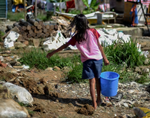
Photo: A girl makes her way home
after fetching water at a coastal
village in Tacloban, Leyte province.
Photograph: Ezra Acayan/NurPhoto
/Rex
|
Three years after the typhoon destroyed more than a million homes and killed 6,000 people, the Philippines has fallen far short on house-building pledge.
When Typhoon Haiyan smashed into the city of Tacloban in the central Philippines almost three years ago, Arsenio was one of the lucky ones – he survived by swimming a kilometre to safety. “Every time there is a storm, I get scared, even after three years,” he said. “I don’t want to go through the same thing again.”
|
Published on Mon, 2016-07-18 00:00
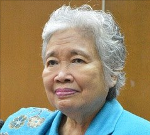
Prof. Leonor Briones
|
Much is made of the public-private partnership (PPP). This is where the public and private sectors combine to produce outcomes which are favorable to the nation. In practice, this has meant Luzon-based transportation infrastructure projects. Visayas and Mindanao have been largely left out. President Duterte will change this. Which is partly why a whopping 62 percent of Mindanaoans voted for him. In a presidential contest where there were four highly supported candidates, this is a remarkable mandate.
|
Published on Sat, 2016-07-09 08:22
While more than 26.3 percent or about 27 million Filipinos live in poverty, the benefits from growth are concentrated in the hands of few billionaire families, the less than 1 percent who dominate the political economy. Tax injustice is imbedded in the system and unregulated corporate activities harm people and the environment. The Philippines can reduce inequality by changing the economic geography. We can reverse the big city-oriented development by supporting the provincial and local economies. We can do this by shifting from conventional, fossil fuel-intensive farming to organic and sustainable agriculture and by changing the pattern of public expenditure so that adequate resources, and authority, too, are deliberately transferred from the rich regions to the poorer ones.
|
Published on Fri, 2016-07-08 18:15
Signing up to the promise of a Philippines where no one is left behind and following the path to sustainability, Social Watch Philippines (SWP), along with the CSO contributors from its network, presents on Friday our "Spotlight Report" on the 2030 Development Agenda in a dialogue with the National and Economic Development Authority (NEDA) at SEAMEO-Innotech, Quezon City.
This is in time for the presentation of the Philippine report to the first High Level Political Forum (HLPF) on July 11-20 at the UN Headquarters in New York. In consort with 22 other countries, the Philippines is expected to lead the national review and report on how the 2030 agenda will be translated into national sustainability plans.
|
Published on Fri, 2016-07-08 18:06
The Philippine economic growth is unjust and not sustainable, as the nation's wealth is concentrated among few billionaires and highly dependent on fossil fuels, according to Social Watch Philippines.
"A just and sustainable growth ensures that no one is left behind," Isagani Serrano, SWP co-convenor and Philippine Rural Reconstruction Movement president, said on Friday.
The civil society group noted the Philippines can achieve its sustainable development goals by 2030 if the economic growth is not concentrated in the hands of a few billionaires.
|
Published on Fri, 2016-07-01 00:00
“For Justice and Sustainability: The other PH 2030 Agenda”
Social Watch Philippines, 2016
Introduction
The Philippines will be free of poverty and will be well on the way to sustainability by 2030. No one will be left behind. That’s the promise, that’s what our government signed up to in 2015.
This report, our report, entitled “FOR JUSTICE AND SUSTAINABILITY: The Other PH 2030 Agenda”, is about taking on our government on that promise. It is an attempt by Social Watch Philippines (SWP) to present its view of the stubborn Philippine development dilemma and how it may be overcome. Through this report we offer our support and cooperation in figuring out the sustainability problem and finding lasting solutions to the cyclical problems of high poverty, high inequality and continuing environmental degradation despite or because of economic growth.
|
Published on Fri, 2016-05-06 12:33
It has been a decade since Social Watch Philippines (SWP) convened the Alternative Budget Initiative (ABI). The consortium has now blossomed to around one hundred and sixty strong civil society organizations and individuals conducting research and lobby efforts in coming out with annual budget analysis, campaigning against lump sum funds, and engaging the national government and the legislature in the budget process by coming out with a civil society-crafted alternative budget, otherwise called as the Orange Book.
Throughout the years, the effort of the consortium to directly engage through the budget process has led to the forging of partnerships with concerned agencies and champion legislators, expansion of the ABI network to more organizations and individuals who share SWP and ABI’s development vision through budget advocacy, and the continuing presence of the ABI in House and Senate to present alternative budget proposals.
|
Published on Thu, 2016-03-03 17:52
With huge money comes huge accountability. For Leonor Briones, lead convenor of Social Watch Philippines (SWP), the billions of funds that would be poured into the soon-to-be-established Bangsamoro government should undergo thorough audit to ensure proper spending and hold specific people responsible for how the money is spent.
By the reckoning of Moro Islamic Liberation Front (MILF) chief negotiation Mohagher Iqbal, the Bangsamoro government will get an initial funding of about P70 billion in its first year of operation, from various sources, including the block grant from the government.
|
Published on Thu, 2015-10-01 08:58
Security was tight during the Papal address at the Opening Plenary of the UN Summit, so I missed these events as only a few civil society representatives could be accommodated, but certainly this was better than Addis Ababa during the 3rd Financing for Conference. The UN General Assembly formally adopted the Sustainable Development Goals (SDGs) at the opening session without further debate as the document had gone through months of debates ad revisions before Member States agreed on the final text.
|
Published on Sat, 2015-09-12 17:56
The Supreme Court (SC) has ordered the executive and legislative departments to answer a recent petition of anti-pork barrel advocates against the government’s spending of lump sum and discretionary funds in this year’s budget.
In session yesterday, the justices decided to require the Palace and both houses of Congress to comment on the petition for certiorari and prohibition filed last Sept. 1 by Social Watch Philippines, led by former national treasurer Leonor Briones.
|
Published on Mon, 2015-08-24 12:27
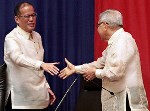
Inquirer Photo / Grig C.
Montegrande
|
OZAMIZ CITY, Philippines—The proposed Freedom of Information (FOI) law is dead, and President Aquino and Speaker Feliciano Belmonte should share the blame for its fate.
Thus declared a group of advocates who have been pushing Congress for years to enact the measure that would allow greater access to public records and help reduce corruption in government.
“(W)ithout decisive support from the President and the leadership of the House of Representatives, the bill will not pass,” read the statement from the Right to Know, Right Now! Coalition which has been campaigning for the FOI bill for more than 15 years.
|
Published on Wed, 2015-07-29 21:02
In response to President Benigno Aquino III’s last State of the Nation Address (SONA), Social Watch Philippines (SWP) lead convener Prof. Leonor Magtolis Briones said that the President has failed to fulfill his promises on the matter of social development and protection of the Constitution. According to Briones, based on the Millennium Development Goals target on poverty, the Philippines has not met its 17.2% poverty rate goal. As of the first semester of 2014, poverty incidence remains at 25.8% proving that despite the flagship poverty reduction programs of the government, poverty levels have remained virtually unchanged.
It is claimed that the Philippines’ gross domestic product (GDP) has improved, however the GDP goals for 2015 may not be attained. GDP growth does not guarantee that the majority of the Filipinos have felt this economic progress. She stressed that, “Many Filipinos still consider themselves poor and hungry. Claims of robust growth can only be substantiated if they benefit from it.
|
Published on Tue, 2015-07-14 14:16
Manila, Philippines–Today, we witness state leaders, high-level officials, civil society groups, and business representatives convene for the Third International Conference on Financing for Development (FfD3) in Addis Ababa, Ethiopia to discuss and agree on an action plan for financing development, including the Sustainable Development Goals to be adopted by UN member states in the September 2015 Summit.
“We started from an optimistic viewpoint on FfD3 and now ending with so much disappointment over what seems like retrogression from old agreements. There is no mention at all of peace dividends generated from the elimination of weapons of mass destruction and nuclear weapons, and the reduction in defense spending. Debt relief and condonation are treated marginally. The emerging document suggests business as usual. It doesn’t explain the fundamental reasons for why there is lack of financing sustainable development,” lamented Isagani Serrano, co-convener of Social Watch Philippines (SWP) and president of the Philippine Rural Reconstruction Movement (PRRM).
|
Published on Wed, 2015-04-22 13:09
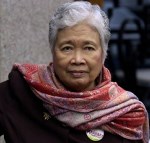
Prof. Leonor Briones.
|
The P70-billion block grant that will be given to the new autonomous region in the Philippines during the first year of the implementation of the Bangsamoro Basic Law raises serious questions of accountability, former National Treasurer Leonor Briones said.
“The most problematic in terms of accountability is the block grant,” Briones, lead convenor of Social Watch Philippines, told a forum on the BBL at the University of the Philippines Thursday.
|
Published on Sun, 2014-11-30 17:32
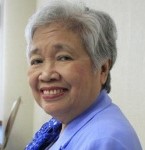
Prof. Leonor Briones.
|
The budget watchdog Social Watch Philippines on Friday criticized the Senate for retaining the new definition of savings in the 2015 budget that it approved, and the possibility of funding for an expense item being declared as savings at any time of the year.
"Such a redefinition can perpetuate the pork barrel system and mechanisms similar to the Disbursement Acceleration Program, both of which have been declared unconstitutional by the Supreme Court," the group said in a statement.
|
Published on Thu, 2014-09-11 19:27
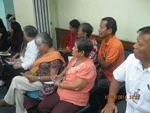
Photo: Social Watch Philippines
|
Social Watch Philippines challenged Congress to reclaim the power of the purse from the Executive at the SWP-Alternative Budget Initiative’s critique of the proposed 2015 budget at the House Committee on Appropriations CSO consultation last Wednesday, September 10, 2014. SWP-ABI also presented their alternative budget proposals for 2015 in the same meeting.
SWP Lead Convenor Prof. Emeritus Leonor Magtolis Briones presented with a summary of the organization’s analysis of the 2015 proposed budget. She focusing on salient issues Congress faces with the current public finance system, such as congressional scrutiny, debt servicing and stark disparities in regional allocations of the budget.
|
Published on Thu, 2014-05-15 09:21
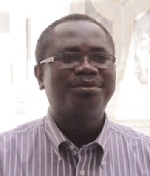
Gustave Assah.
|
The participants in the civil society strategy meeting on monitoring and accountability organized by Social Watch last february in Montevideo were asked about how they personally work and relate with the huge task of making the powerful accountable. Here is what they said:
|
Published on Sat, 2013-12-14 23:00
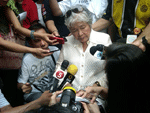
Prof. Leonor Briones
|
In the last month or so, the Philippines has received overwhelming sympathy and support from the rest of the world. These are through kind words, prayers and donations meant for the survivors of super typhoon Yolanda.
The numbers are online, the Budget Department says. Anybody can easily go to www.faith.gov.ph—the Foreign Aid Transparency Hub. Aggregate amounts are posted on the right side of the site, broken down into cash and non-cash donations.
|
Published on Thu, 2013-12-05 23:11
Three days into the first month since super Typhoon Yolanda flattened many parts of central Philippines, media groups, netizens, and disaster risk reduction advocates come together to talk on steps to ensure that the funds and goods donated for Yolanda victims will be accounted for and will match of the needs of about 11 million people it affected.
More than tracking where foreign aid goes as the country continues to recover from Typhoon Yolanda (Haiyan), citizens need to keep an eye on how government’s calamity funds are spent, Dr. Leonor Briones, lead convenor of Social Watch Philippines advised civil society organizations on December 4th.
|
Published on Thu, 2013-10-31 13:05
Social Watch Philippines (SWP), Silliman University in Negros Oriental and Mindanao State University (MSU) in the Autonomous Region of Muslim Mindanao (ARMM) launched the People’s Public Finance Institute (PPFI), which is the first-ever center on teaching citizens to learn and be actively involved in public finance in the Philippines.
“As part of Social Watch Philippines’ commitment to asserting social development for people’s rights and empowerment, we are setting up PPFI centers in various State Colleges and Universities (SUCs) all over the country,” said former national treasurer and SWP lead convenor Leonor Magtolis Briones.“Through the Institute, SWP and SUCs will educate the general public, civil society organizations (CSOs) and interested local government officials on national and local public finance working under the framework of citizens’ participation,” she added.
|
Published on Thu, 2013-10-17 14:44
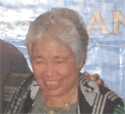
Prof. Leonor Briones
|
In the Philippines, Social Watch Philippines monitors the MDG programs as implemented by the government. Its main advocacy is more government spending for health, education, agriculture, the environment, and for social protection for all. It has organized the Alternative Budget Initiative (ABI) which proposes alternative budgets for these MDG-related expenditures.
|
Published on Fri, 2013-09-13 22:48
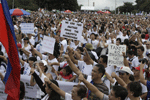
Thousands march against
pork barrels. (Photo: VoA)
|
“The abolition of the pork barrel system should be total” said Leonor Briones, lead convenor Social Watch Philippines, to a Congressional committee in Manila, bringing to legislators the message that hundreds of thousands of people had reaffirmed in the streets during marches against corruption in the previous days.
“Pork barrel” is the popular name of a system that allows members of parliament the direct allocation of budget funds to pet projects in their constituencies. Some “pork barrel amount to the equivalent of four million dollars a year.
The president himself manages a “pork barrel fund” of some 500 million dollars and several items of the Special Purpose Funds (SPF) in the national budget for 2014. “SPFs breed corruption. How can Congress scrutinize the SPF when there is no detail? It is just one chart in the budget documents and one line in the summary papers,” SWP said Briones.
|
Published on Thu, 2013-08-22 00:00
"Citizen monitoring and accountability of governments, corporations and international institutions are essential for a new development agenda to succeed".
Roberto Bissio, Coordinator of Social Watch, shares his reflections on the Social Watch Philippines' National Consultation on the High Level Report on the Post 2015 Agenda.
|
Published on Wed, 2013-07-31 21:35
This year Social Watch Philippines and the Alternative Budget Initiative or ABI will particularly scrutinize the Priority Development Assistance Fund or “pork barrel” and the transfers and allocations for the government’s Special Purpose Funds. Department allocations will also be assessed by the Initiative, particularly the allocations for health, education, agriculture, social welfare and the environment.
It’s that time of the year again when Congress debates and finalizes the National Budget for 2014. Budget hearings, pork barrels, agency allocations and special purpose funds will be, or should be, buzzwords in media for the next few months.
|
Published on Thu, 2013-07-18 11:38

Prof. Leonor Briones.
(Photo: SW)
|
After President Noynoy Aquino’s State of the Nation Address (SONA) on Monday, July 22, PNoy’s proposed budget for 2014 will be under scrutiny in a forum to be held at the University of the Philippines National College of Public Administration and Governance Assembly Hall. SW Coordinating Committee Co-chair, Former National Treasurer and budget expert Professor Emeritus Leonor Magtolis Briones will be the guest speaker in the forum.
Entitled “#Kabataan Roadtrip: Sa’n na Tayo Nakarating, Sa’n na Tayo Papunta?”, the public forum will focus on the government’s allocations and priorities for the youth. It is primarily organized by UP Samahan Tungo sa Progresibong Administrasyon (UP STPA), a socio-academic organization of public administration students of UP NCPAG. They are partnered with Social Watch Philippines, the People’s Public Finance Institute, the Alternative Budget Initiative, PALS NCPAG and the University Student Council.
|
Published on Fri, 2012-12-07 13:00

Members of the Alternative Budget
Institute (ABI), a consortium of 60
non-governmental organizations
led by Social Watch Philippines,
called on citizens to vote only for
candidates supporting the MDGs.
(Photo: ABI-ENVI)
|
The Philippines needs a post-2015 development agenda that reclaims human rights as the normative framework, especially ensuring the right to education, health and decent work, and addressing the long-standing inequalities, concludes the report 2013 of Social Watch-Philippines. Economic growth averaged 4.7 per cent a year since 2000 in this South Asian country, but only the elites harvested the benefits, while poverty increased to reach more than one of every four Filipinos, says the study.
|
Published on Mon, 2012-11-26 08:05

“People over profits,” a global
demand. (Photo: Fibonacci Blue
/CC License)
|
“It’s not just money that’s required for achieving the MDGs. Another reason why we are so behind with them is the Philippines’ warped development. Yes, there is economic growth, but it has been accompanied by greater inequality, unemployment, underemployment and environmental degradation,” wrote Jessica Cantos, Co-Convener of Social Watch Philippines, in a report published by New Internationalist, newspaper specialized on issues of world poverty and inequality.
|
Published on Mon, 2012-09-10 08:38
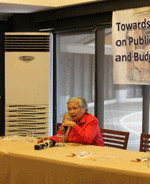
Leonor Magtolis Briones. (Photo:
Philippine Rural Reconstruction
Movement)
|
Social Watch Philippines and Alternative Budget Initiative are set to probe into President Benigno Aquino III’s proposed budget items for 2013 that are still unclear or not visible. “We have to be more vigilant as the 2.006 trillion pesos [47.74 billion US dollars] proposed 2013 appropriations is the first budget proposal to exceed the two-trillion pesos mark,” explained former national treasurer and Social Watch Philippines lead convenor Leonor Magtolis Briones.
|
Published on Mon, 2012-09-03 12:50
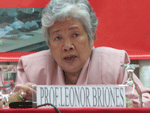
Leonor Briones. (Photo:
Freedom from Debt Coalition)
|
Social Watch Philippines is questioning some items in the 2013 budget submitted by the government to the Congress. The convenor of this national coalition of civil society groups, Leonor Briones, said there are lump sum appropriations called “special purpose funds”, which did not provide any breakdowns.
|
Published on Wed, 2012-04-18 08:36
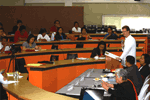
Launch ceremony of the project
last year, at the University of the
Philippines. (Photo: UCA News)
|
The non governmental organization Code: Reforms for Economic Development (Code: RED) and Social Watch Philippines launched a policy monograph on transparency and accountability in local governance, after several months of workshops in six municipalities to allow grassroots groups to get more involved in local public finance.
|
Published on Thu, 2012-03-15 13:45
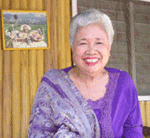
Leonor Briones
|
The impact of typhoons, earthquakes, climate change and other external factors make it difficult for the Philippines to reach its economic growth targets of 5 percent to 6 percent this year and 6 percent to 7 percent next year, warned Social Watch Philippines this week.
|
Published on Thu, 2011-09-22 13:04
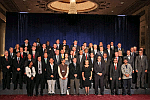
Launch of the Open Government
Partnership in New York
(Photo: Inesc)
|
Sources: Transparency International, Financial Task Force, HumanRights.gov, Inesc
A group of government and civil society organizations from all over the planet, among them the Instituto de Estudos Socioeconômicos (Inesc, focal point of Social Watch in Brazil), launched this Wednesday in New York the Open Government Partnership (OGP), a multilateral initiative that aims to promote transparency, fight corruption, strengthen accountability and empower citizens.
|
Published on Wed, 2011-07-13 11:28
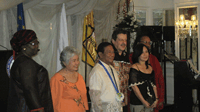
Co-chairs of Social Watch Tanya Dawkins
and Emily Sikazwe, SW Philipines lead
convenor Leonor Briones and convenor
Marivic Raquiza, SW coordinator Roberto Bissio
and vice president of the Philippines
Jejomar Binay. (Photo: Social Watch)
|
Sources: Manila Bulletin, GMA News.
Philippine government has no reason to apologize for the persistent diaspora of workers, said Vice President Jejomar Binay in the opening session of the 5th Social Watch Global Assembly on Tuesday in Manila, according to Manila Bulletin newspaper.
|
Published on Mon, 2011-07-11 08:19
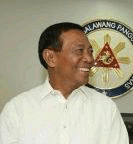
Jejomar Binay. (Photo:
Pilippine VP Office)
|
Sources: The Philippine Star, The Daily Tribune.
Leading Philippine newspapers and other media are paying attention to the Social Watch 2011 Global Assembly that will begin tomorrow in Manila. The participation of Vice President Jejomar Binay in the first session, where he will deliver the inaugural speech, was stressed by The Philippine Star, The Daily Tribune and InterAksion, news portal of TV5.
|
Published on Wed, 2011-06-15 11:35
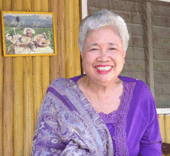
Leonor Magtolis Briones
|
Source
Business Mirror
“On June 12, 1898, we declared ourselves independent from the crushing heel of Spanish colonialism” but “became a colony of the United States after a bloody war that killed thousands of Filipinos,” wrote Leonor Magtolis Briones, lead convenor of Social Watch Philippines, in this column for Bussiness Mirror, a major paper in her country.
|
Published on Mon, 2010-12-13 13:51
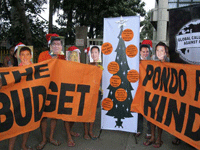
Source: Social Watch Philippines
Members of nongovernment organizations and urban poor groups today fixed up a Christmas Tree in front of the Philippine Coconut Authority in Quezon City in time for the Bicameral Conference Committee´s meeting to finalize the 2011 national budget.
"This is our Christmas Tree of Hope and Reform. We are decorating this with Christmas Balls expressing our call for the Bicameral Conference Committee members to give the poor people a merry Christmas by realigning lump sum items in the budget to increase the budget for pro-poor programs," said Marivic Raquiza, convenor of Social Watch Philippines (SWP) which organized the Alternative Budget Initiative, the network globally acknowledged for initiating Congress-citizens´ partnerships for alternative budget proposals.
|
Published on Wed, 2010-10-27 07:34
Since it was set-up in 1997, Social Watch Philippines (SWP) has annually put forward a strategy of advocacy, awareness-building, monitoring, organizational development and networking. Based in Quezon City, one of the major cities in Metro Manila, the network that started with twenty seven civil society organizations and individuals has now grown to embrace more than a hundred citizens’ group, networks and individuals.
|
Published on Thu, 2010-08-12 06:57
Source: Business Mirror
“Stop making highways that lead to nowhere and waiting sheds waiting for no one” said former national treasurer and lead convenor of Social Watch in The Philippines, Prof. Leonor Briones, who advised lawmakers to align their pork barrel (goverment funds allocated to legislators for local projects) to achieve the United Nations Millennium Development Goals (MDGs) that eradicate hunger and poverty in their respective areas of jurisdiction.
|
|
Source: 
. Published on Mon, 2010-05-24 07:48
|
|
Source: 
. Published on Wed, 2009-05-27 17:54
|
|
Source: 
. Published on Thu, 2009-03-19 17:45
|
|
Source: 
. Published on Thu, 2009-03-19 15:39
Auteur:
Liling Magtolis Briones
|
Published on Tue, 2007-12-18 15:42
Auteur:
Social Watch Phillipines
Social Watch Philippines released its global report last November, to coincide with the conclusion of the National Consultation on Financing for Development that was attended by civil society groups and discussed the status of the country’s programs to meet the United Nations Millennium Development Goals.
|
Source: Business Mirror, Philippines. Published on Mon, 2007-11-26 14:29
Auteur:
Leonor Magtolis Briones
The death by suicide of a twelve-year old girl from Davao due to extreme poverty has touched the collective conscience of the country. People of consequence, from the President down to bureaucrats, social anthropologists, civil society organizations, and media personalities have endeavored to explain why a child would commit suicide.
|
Published on Sat, 2007-09-01 18:55
Auteur:
Leonor Magtolis Briones
|
|
Source: 
. Published on Mon, 2007-08-20 10:32
|
|
Source: 
. Published on Fri, 2007-08-17 10:44
|
|
Source: 
. Published on Tue, 2007-08-07 13:34
Auteur:
Marivic Raquiza and Nadia Ginete
|
|
Source: 
. Published on Mon, 2007-05-14 10:13
|
|
Source: 
. Published on Mon, 2007-03-05 12:11
|
|
Source: 
. Published on Thu, 2007-01-18 10:02
Auteur:
Liling Magtolis Briones
|
|
Source: 
. Published on Tue, 2006-08-29 11:44
|
|
Source: 
. Published on Wed, 2006-06-28 11:05
|
|
Source: 
. Published on Thu, 2006-02-16 12:20
Auteur:
Ellalyn B. De Vera
|
|
Source: 
. Published on Thu, 2006-02-16 11:47
|
Published on Wed, 2005-09-21 14:24
Social Watch Philippines launched the Social Watch Philippines 2005 Report “Race for Survival Hurdles on the road to meeting the MDGs in 2015” and the Social Watch Annual Report 2005 “Roars and Whispers. Gender and poverty: promises vs. action” last September 8, 2005.
|
|
Source: 
. Published on Thu, 2004-12-02 10:24
|
|
Source: 
. Published on Thu, 2004-12-02 10:23
|
|
Source: 
. Published on Thu, 2004-12-02 10:21
Auteur:
Rexcel Sorza, IOL Correspondent
|
|
Source: 
. Published on Thu, 2004-12-02 10:20
|
|
Source: 
. Published on Thu, 2004-12-02 10:20
|
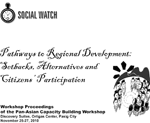
Workshop Proceedings of the Pan-Asian Capacity Building Workshop
Discovery Suites, Ortigas, Pasig City
November 25-27, 2010
|
|



